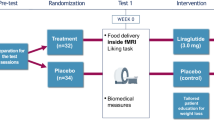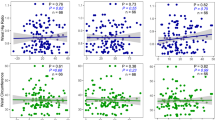Abstract
Background/objectives
Patients who receive Roux-en-Y gastric bypass (RYGB) lose more weight than those who receive vertical sleeve gastrectomy (VSG). RYGB and VSG alter hedonic responses to sweet flavor, but whether baseline differences in hedonic responses modulate weight loss after RYGB or VSG remains untested.
Participants/methods
Male and female candidates (n = 66) for RYGB or VSG were recruited and tested for their subjective liking and wanting ratings of sucrose solutions and flavored beverages sweetened with aspartame. Participants were classified by unsupervised hierarchical clustering for their liking and wanting ratings of sucrose and aspartame. Participant liking ratings were also used in a supervised classification using pre-established categories of liking ratings (liker, disliker, and inverted u-shape). Effects of categories obtained from unsupervised or supervised classification on body weight loss and their interaction with surgery type were analyzed separately at 3 and 12 months after surgery using linear models corrected for sex and age.
Results
RYGB participants lost more body weight compared with VSG participants at 3 and 12 months after surgery (P < 0.001 for both time points). Unsupervised clustering analysis identified clusters corresponding to high and low wanting or liking ratings for sucrose or aspartame. RYGB participants in high-wanting clusters based on sucrose, but not aspartame, lost more weight than VSG at both 3 (P = 0.01) and 12 months (P = 0.03), yielding a significant cluster by surgery interaction. Categories based on supervised classification using liking ratings for sucrose or aspartame showed no significant effects on body weight loss between RYGB and VSG participants.
Conclusions
Classification of patients into high/low-wanting ratings for sucrose before surgery can predict differential body weight loss after RYGB or VSG in adults and could be used to advise on surgery type.
This is a preview of subscription content, access via your institution
Access options
Subscribe to this journal
Receive 12 print issues and online access
$259.00 per year
only $21.58 per issue
Buy this article
- Purchase on Springer Link
- Instant access to full article PDF
Prices may be subject to local taxes which are calculated during checkout





Similar content being viewed by others
References
Chang SH, Stoll CR, Song J, Varela JE, Eagon CJ, Colditz GA. The effectiveness and risks of bariatric surgery: an updated systematic review and meta-analysis, 2003–2012. JAMA Surg. 2014;149:275–87.
King WC, Hinerman AS, Belle SH, Wahed AS, Courcoulas AP. Comparison of the performance of common measures of weight regain after bariatric surgery for association with clinical outcomes. JAMA. 2018;320:1560–9.
Osland E, Yunus RM, Khan S, Memon B, Memon MA. Weight loss outcomes in laparoscopic vertical sleeve gastrectomy (LVSG) versus laparoscopic Roux-en-Y gastric bypass (LRYGB) procedures: a meta-analysis and systematic review of randomized controlled trials. Surg laparosc Endosc Percutan Tech. 2017;27:8–18.
Celio AC, Wu Q, Kasten KR, Manwaring ML, Pories WJ, Spaniolas K. Comparative effectiveness of Roux-en-Y gastric bypass and sleeve gastrectomy in super obese patients. Surg Endosc. 2017;31:317–23.
Rondelli F, Bugiantella W, Vedovati MC, Mariani E, Balzarotti Canger RC, Federici S, et al. Laparoscopic gastric bypass versus laparoscopic sleeve gastrectomy: a retrospective multicenter comparison between early and long-term post-operative outcomes. Int J Surg. 2017;37:36–41.
Panagiotou OA, Markozannes G, Adam GP, Kowalski R, Gazula A, Di M, et al. Comparative effectiveness and safety of bariatric procedures in medicare-eligible patients: a systematic review. JAMA Surg. 2018;153:e183326.
Ahmed B, King WC, Gourash W, Belle SH, Hinerman A, Pomp A, et al. Long-term weight change and health outcomes for sleeve gastrectomy (SG) and matched Roux-en-Y gastric bypass (RYGB) participants in the Longitudinal Assessment of Bariatric Surgery (LABS) study. Surgery. 2018;164:774–83.
Larraufie P, Roberts GP, McGavigan AK, Kay RG, Li J, Leiter A. et al. Important role of the GLP-1 axis for glucose homeostasis after bariatric surgery. Cell Rep. 2019;26:1399–1408.e6.
Behary P, Miras AD. Food preferences and underlying mechanisms after bariatric surgery. Proc Nutr Soc. 2015;74:419–25.
Miras AD, le Roux CW. Mechanisms underlying weight loss after bariatric surgery. Nat Rev Gastroenterol Hepatol. 2013;10:575–84.
Lauti M, Kularatna M, Hill AG, MacCormick AD. Weight regain following sleeve gastrectomy-a systematic review. Obes Surg. 2016;26:1326–34.
Al-Khyatt W, Ryall R, Leeder P, Ahmed J, Awad S. Predictors of inadequate weight loss after laparoscopic gastric bypass for morbid obesity. Obes Surg. 2017;27:1446–52.
Scozzari G, Passera R, Benvenga R, Toppino M, Morino M. Age as a long-term prognostic factor in bariatric surgery. Ann Surg. 2012;256:724–8. discussion728-9
Andersen JR, Aadland E, Nilsen RM, Vage V. Predictors of weight loss are different in men and women after sleeve gastrectomy. Obesity Surg. 2014;24:594–8.
Parri A, Benaiges D, Schroder H, Izquierdo-Pulido M, Ramon J, Villatoro M, et al. Preoperative predictors of weight loss at 4 years following bariatric surgery. Nutrition Clin Pract. 2015;30:420–4.
Baldridge AS, Pacheco JA, Aufox SA, Kim KY, Silverstein JC, Denham W, et al. Factors associated with long-term weight loss following bariatric surgery using 2 methods for repeated measures analysis. Am J Epidemiol. 2015;182:235–43.
Generali I, De Panfilis C. Personality traits and weight loss surgery outcome. Curr Obes Rep. 2018;7:227–34.
Marek RJ, Tarescavage AM, Ben-Porath YS, Ashton K, Merrell Rish J, Heinberg LJ. Using presurgical psychological testing to predict 1-year appointment adherence and weight loss in bariatric surgery patients: predictive validity and methodological considerations. Surg Obes Relat Dis. 2015;11:1171–81.
Wakayama L, Nameth K, Adler S, Safer DL. Replication and extension of dietary adherence as a predictor of suboptimal weight-loss outcomes in postbariatric patients. Surg Obes Relat Dis. 2019;15:91–6.
Sarwer DB, Wadden TA, Moore RH, Baker AW, Gibbons LM, Raper SE, et al. Preoperative eating behavior, postoperative dietary adherence, and weight loss after gastric bypass surgery. Surg Obes Relat Dis. 2008;4:640–6.
Ahmed K, Penney N, Darzi A, Purkayastha S. Taste changes after bariatric surgery: a systematic review. Obes Surg. 2018;28:3321–32.
Kittrell H, Graber W, Mariani E, Czaja K, Hajnal A, Di Lorenzo PM. Taste and odor preferences following Roux-en-Y surgery in humans. PLoS ONE. 2018;13:e0199508.
Hansen TT, Jakobsen TA, Nielsen MS, Sjodin A, Le Roux CW, Schmidt JB. Hedonic changes in food choices following Roux-en-Y gastric bypass. Obes Surg. 2016;26:1946–55.
Miras AD, Jackson RN, Jackson SN, Goldstone AP, Olbers T, Hackenberg T, et al. Gastric bypass surgery for obesity decreases the reward value of a sweet-fat stimulus as assessed in a progressive ratio task. Am J Clin Nutr. 2012;96:467–73.
Sudan R, Sudan R, Lyden E, Thompson JS. Food cravings and food consumption after Roux-en-Y gastric bypass versus cholecystectomy. Surg Obes Relat Dis. 2017;13:220–6.
Nielsen MS, Christensen BJ, Ritz C, Rasmussen S, Hansen TT, Bredie WLP, et al. Roux-En-Y gastric bypass and sleeve gastrectomy does not affect food preferences when assessed by an ad libitum buffet meal. Obes Surg. 2017;27:2599–605.
Sugerman HJ, Londrey GL, Kellum JM, Wolf L, Liszka T, Engle KM, et al. Weight loss with vertical banded gastroplasty and Roux-Y gastric bypass for morbid obesity with selective versus random assignment. Am J Surg. 1989;157:93–102.
Sugerman HJ, Starkey JV, Birkenhauer R. A randomized prospective trial of gastric bypass versus vertical banded gastroplasty for morbid obesity and their effects on sweets versus non-sweets eaters. Ann Surg. 1987;205:613–24.
Herpertz S, Kielmann R, Wolf AM, Hebebrand J, Senf W. Do psychosocial variables predict weight loss or mental health after obesity surgery? A systematic review. Obes Res. 2004;12:1554–69.
Fox B, Chen E, Suzo A, Jolles S, Greenberg JA, Campos GM, et al. Dietary and psych predictors of weight loss after gastric bypass. J Surg Res. 2015;197:283–90.
Berridge KC, Ho CY, Richard JM, DiFeliceantonio AG. The tempted brain eats: pleasure and desire circuits in obesity and eating disorders. Brain Res. 2010;1350:43–64.
Finlayson G, King N, Blundell JE. Liking vs. wanting food: importance for human appetite control and weight regulation. Neurosci Biobehav Rev. 2007;31:987–1002.
Berridge KC. Motivation concepts in behavioral neuroscience. Physiol Behav. 2004;81:179–209.
Thompson DA, Moskowitz HR, Campbell RG. Effects of body weight and food intake on pleasantness ratings for a sweet stimulus. J Appl Physiol. 1976;41:77–83.
Iatridi V, Hayes J, Yeomans M. Reconsidering the classification of sweet taste liker phenotypes: a methodological review. Food Qual Prefer. 2019;72:56–76.
Garbutt JC, Osborne M, Gallop R, Barkenbus J, Grace K, Cody M, et al. Sweet liking phenotype, alcohol craving and response to naltrexone treatment in alcohol dependence. Alcohol Alcohol. 2009;44:293–300.
Garbutt JC, Kampov-Polevoy AB, Kalka-Juhl LS, Gallop RJ. Association of the sweet-liking phenotype and craving for alcohol with the response to naltrexone treatment in alcohol dependence: a randomized clinical trial. JAMA Psychiatry. 2016;73:1056–63.
Iatridi V, Hayes JE, Yeomans MR. Quantifying sweet taste liker phenotypes: time for some consistency in the classification criteria. Nutrients. 2019;11:1–24.
Sclafani A, Ackroff K. Glucose- and fructose-conditioned flavor preferences in rats: taste versus postingestive conditioning. Physiol Behav. 1994;56:399–405.
Klein DA, Schebendach JS, Devlin MJ, Smith GP, Walsh BT. Intake, sweetness and liking during modified sham feeding of sucrose solutions. Physiol Behav. 2006;87:602–6.
Klein DA, Schebendach JE, Brown AJ, Smith GP, Walsh BT. Modified sham feeding of sweet solutions in women with and without bulimia nervosa. Physio Behav. 2009;96:44–50.
Hogenkamp PS, Shechter A, St-Onge MP, Sclafani A, Kissileff HR. A sipometer for measuring motivation to consume and reward value of foods and beverages in humans: description and proof of principle. Physiol Behav. 2017;171:216–27.
Garneau N, Nuessle T, Mendelsber B, Shepard S, Tucker R. Sweet liker status in children and adults: Consequences for beverage intake in adults. Food Qual Prefer. 2018;65:175–80.
Kim J, Prescott J, Kim K. Emotional responses to sweet foods according to sweet liker status. Food Qual Prefer. 2017;59:1–7.
Berry DA. Logarithmic transformations in ANOVA. Biometrics. 1987;43:439–56.
Measures of difference for compositional data and hierarchical clustering methods. Proc IAMG. 1998;98:526–31.
Park P, Manjourides J, Bonetti M, Pagano M. A permutation test for determining significance of clusters with applications to spatial and gene expression data. Comput Stat Data Anal. 2009;53:4290–4300.
Bray GA, Barry RE, Benfield JR, Castelnuovo-Tedesco P, Rodin J. Intestinal bypass surgery for obesity decreases food intake and taste preferences. TAm J Clin Nutr. 1976;29:779–83.
Mathes CM, Spector AC. Food selection and taste changes in humans after Roux-en-Y gastric bypass surgery: a direct-measures approach. Physiol Behav. 2012;107:476–83.
Ochner CN, Kwok Y, Conceicao E, Pantazatos SP, Puma LM, Carnell S, et al. Selective reduction in neural responses to high calorie foods following gastric bypass surgery. Ann Surg. 2011;253:502–7.
Ochner CN, Stice E, Hutchins E, Afifi L, Geliebter A, Hirsch J, et al. Relation between changes in neural responsivity and reductions in desire to eat high-calorie foods following gastric bypass surgery. Neuroscience. 2012;209:128–35.
Bueter M, Miras AD, Chichger H, Fenske W, Ghatei MA, Bloom SR, et al. Alterations of sucrose preference after Roux-en-Y gastric bypass. Physiol Behav. 2011;104:709–21.
Pliner P, Fleming AS. Food intake, body weight, and sweetness preferences over the menstrual cycle in humans. Physiol Behav. 1983;30:663–6.
Acknowledgements
This work was supported by NIH 1R01DK108643 (HR Kissileff, PI), FONDECYT Regular 1150274 (Perez-Leighton) and the New York Nutrition Obesity Research Center (DK-26687). Aspartame was a gift from Ajinomoto Co., Inc., Tokyo, Japan
Author information
Authors and Affiliations
Corresponding author
Ethics declarations
Conflict of interest
The authors declare that they have no conflict of interest.
Additional information
Publisher’s note Springer Nature remains neutral with regard to jurisdictional claims in published maps and institutional affiliations.
Supplementary information
Rights and permissions
About this article
Cite this article
Perez-Leighton, C.E., Hamm, J.D., Shechter, A. et al. Preoperative liking and wanting for sweet beverages as predictors of body weight loss after Roux-en-Y gastric bypass and sleeve gastrectomy. Int J Obes 44, 1350–1359 (2020). https://doi.org/10.1038/s41366-019-0474-1
Received:
Revised:
Accepted:
Published:
Issue Date:
DOI: https://doi.org/10.1038/s41366-019-0474-1



